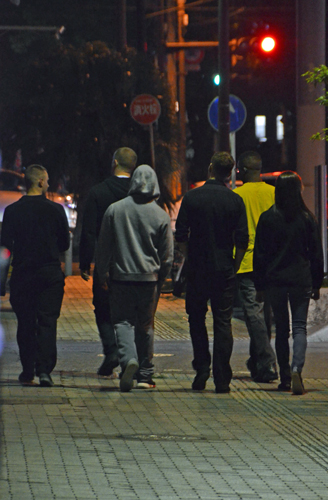Easing of restrictions on US soldiers’ drinking worries residents

Pedestrian assumed to be U.S. military personnel at Gate Street in Okinawa City, on the evening of December 9.
December 10, 2014 Ryukyu Shimpo
On December 9, U.S. forces in Japan eased its ‘liberty policy’, the code of conduct for the U.S. service members and civilian employees in Okinawa. The new regulation allows them to stay out and drink somewhat freely during off-duty hours. The U.S. military notified the Okinawa Prefectural Government about the change to code of conduct measures on November 26, alleging that the number of incidents and accidents involving U.S. military personnel had decreased. Despite that, during the following 11 days, four incidents and accidents, involving drunken American soldiers, took place. However, concerns are spreading among local people.
The new rules allow U.S. service members to drink relatively freely off base except between midnight and 5 a.m. They have been limited to drink only two canned beers at off-base restaurants, not including bars, at supper time between 6 p.m. and 10 p.m. Service members who are E5 (sergeant rank or equivalent) and below are also allowed to stay out accompanied by superiors.
Heads of the local municipal governments of cities, towns and villages, where the U.S. military bases are located, protested the U.S. military’s measure and proposed to postpone the implementation of it.
At 9 p.m. on December 9, there were seven or eight people seemingly U.S. military personnel at Gate Street near Kadena Air Base. However, pedestrian traffic was sparse in towns near the U.S. bases.
A shop owner said, “We can’t tell you whether the measure will have an effect on our business until the weekend comes. “ An employee of a store at Miyagi, Chatan, where a lot of housing for U.S. military personnel is located, said, “We welcome an increasing number of customers. But, we do not want them to cause trouble.”
(English translation by T&CT)
Previous Article:75-year-old Okinawan woman attains a Karate black belt
Next Article:Yaese Town and Koyo High School co-create Chinese-language promotional video on Okinawa tourism
[Similar Articles]
- Off-base drinking ban for U.S. soldiers in Okinawa to be eased
- U.S soldier arrested for trespassing in Okinawa City: possibly intoxicated
- Okinawa City Council passes protest resolution over hit-and-run
- U.S. soldier arrested for trespassing in Chatan
- Arrests of US service members for drunk driving rise 45%
 Webcam(Kokusai Street)
Webcam(Kokusai Street)


